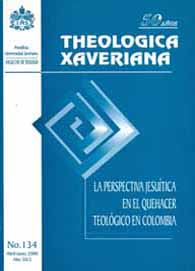Abstract
Es apenas lógico en una orden religiosa, como la Compañía de Jesús, que la teología sea parte integrante de su quehacer apostólico. Así ha sucedido en la provincia de Colombia, desde el momento mismo en que los primeros jesuitas arribaron al entonces Nuevo Reino de Granada. La historia de la teología
en nuestra patria está íntimamente unida al Colegio de la Compañía de Santafé y a la Academia Javeriana, entidades que llevaron a cabo un proceso de creciente eficacia teológica, cualitativa y cuantitativa, en beneficio de los propios jesuitas en formación, de los estudiantes del Colegio-Seminario de San Bartolomé y, en general, de la sociedad, especialmente en sus estamentos más pobres, los indígenas y los esclavos. Unida indisolublemente a la actividad apostólica de la provincia, la teología fue el elemento espiritual que orientó y dinamizó la empresa jesuítica, a mayor gloria de Dios, hasta el funesto golpe de la expulsión, en 1767.
This journal is registered under a Creative Commons Attribution 4.0 International Public License. Thus, this work may be reproduced, distributed, and publicly shared in digital format, as long as the names of the authors and Pontificia Universidad Javeriana are acknowledged. Others are allowed to quote, adapt, transform, auto-archive, republish, and create based on this material, for any purpose (even commercial ones), provided the authorship is duly acknowledged, a link to the original work is provided, and it is specified if changes have been made. Pontificia Universidad Javeriana does not hold the rights of published works and the authors are solely responsible for the contents of their works; they keep the moral, intellectual, privacy, and publicity rights.
Approving the intervention of the work (review, copy-editing, translation, layout) and the following outreach, are granted through an use license and not through an assignment of rights. This means the journal and Pontificia Universidad Javeriana cannot be held responsible for any ethical malpractice by the authors. As a consequence of the protection granted by the use license, the journal is not required to publish recantations or modify information already published, unless the errata stems from the editorial management process. Publishing contents in this journal does not generate royalties for contributors.


